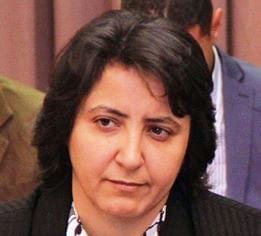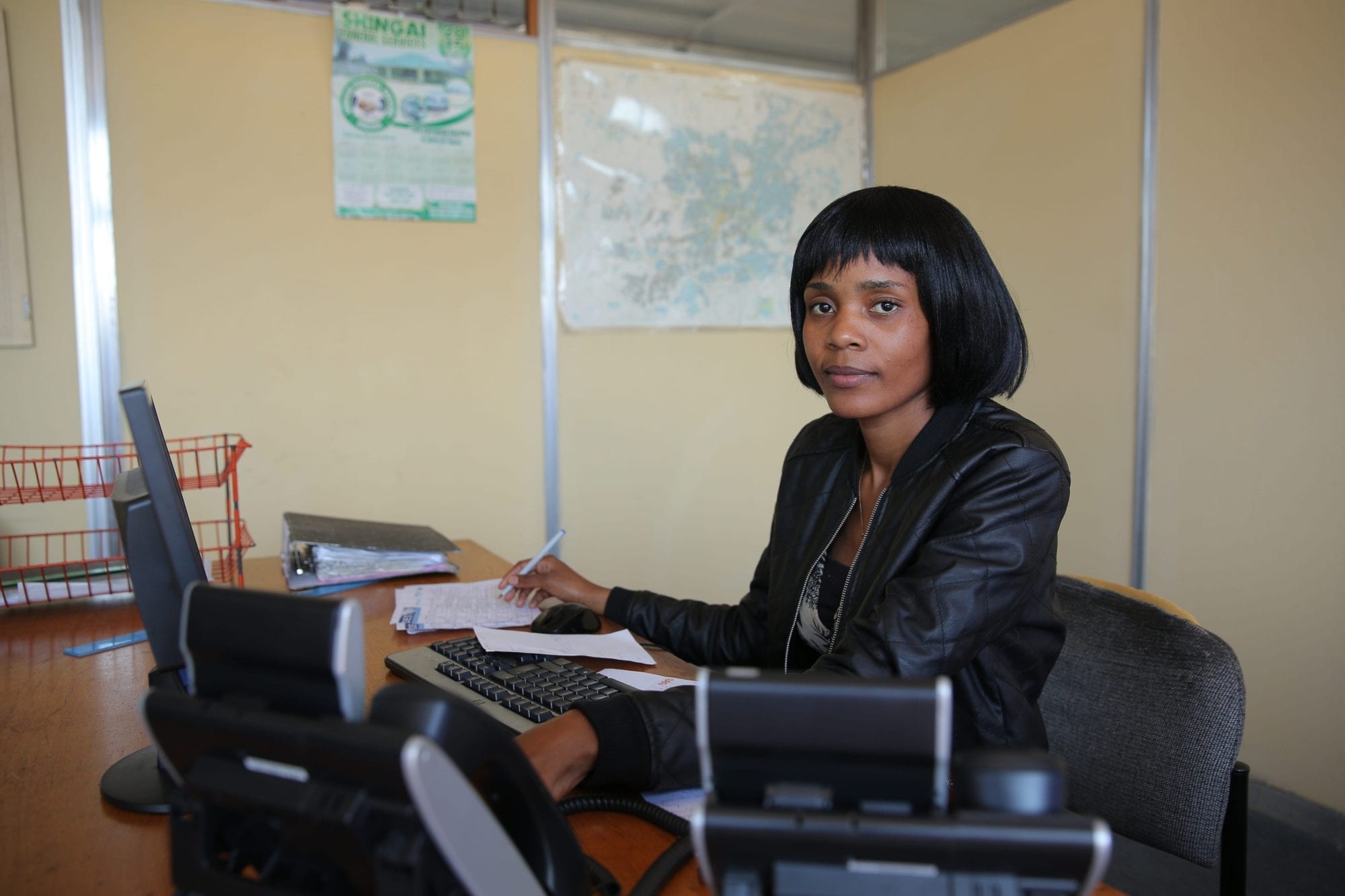
Dec 20, 2016
Workers around the world are losing ground in their paychecks as annual growth in real wages around the world fell to 1.7 percent in 2015, down from 2.5 percent in 2012, according to a new International Labor Organization (ILO) report.
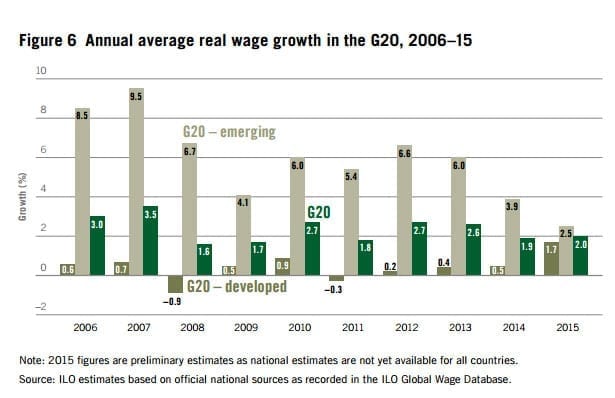
Credit: ILO
Wages have stagnated primarily in developing and emerging economies, especially in Latin America and Eastern Europe, according to the Global Wage Report 2016/17.
Among developing countries—including China, India, Brazil, Nigeria and many other rapidly growing economies—real wage growth in 2012 was around 6.6 percent, but by 2015 it had fallen to just 2.5 percent. Growth in developing countries had fueled economic recovery after the 2008 recession.
Meanwhile, wages in developed countries rose between 2012 and 2015—from 0.2 percent in the wake of the financial crisis, to a 10-year high of 1.7 percent. This uptick does not compensate for slowing wage growth in developing countries, yielding a net decrease worldwide.
To create sustainable wage growth, the ILO calls on countries to enact policy reforms that will benefit working people, such as raising minimum wages and increasing workers’ access to collective bargaining, particularly in global supply chains. The ILO also calls for coordination at the global level to boost wages, reduce inequality and protect working people’s right to freedom of association.
Productivity Outpaces Wages, Workers Miss Out
In the majority of countries, “wage growth in recent decades has lagged behind the growth of labor productivity,” according to the report. This means that even as major economic sectors like agriculture and construction have become more prosperous, workers are getting a smaller and smaller share of that prosperity.
The ILO attributes this divide to the weakening of labor market institutions and pressure from financial markets to direct company profits toward investors rather than workers. As a result, the ILO report says stagnating wages in developing countries are part of a slow but steady decline in working people’s share of wealth in the global economy.
Women have been especially hard hit, earning between 10 percent and 40 percent less than men in hourly wages in many countries. In Azerbaijan and Benin, the gender gap was the highest at nearly 45 percent. Many women work in low-paid, precarious jobs and although they contribute 66 percent of the world’s work, they earn 10 percent of income.
Crucially, the report highlights the frequent correlation between greater wage inequality, greater household income inequality and the declining number of jobs.
Read the full report.
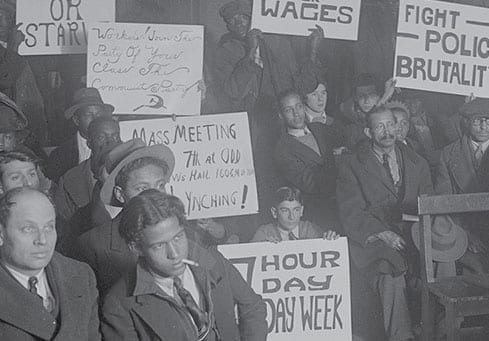
Dec 19, 2016
Members of labor unions and other nongovernmental organizations (NGOs) are invited to contribute to a United Nations report on civil society’s successes over the past decade. The report’s goal is to serve as a reminder of the importance of peace, security, prosperity, social progress and human rights to society.
For his final report to the UN Human Rights Council, Maina Kiai, the Special Rapporteur on the rights to freedom of peaceful assembly and of association, is seeking input describing specific, real-world examples of civil society achievements and successes over the past decade, the context in which these achievements occurred and the impact of these successes or achievements on society at large (at the local, national, and international level). The examples may be included in the report.
More information and a questionnaire–in English, Spanish and French–to facilitate your submission are available here.
Although it is well known that space for civil society globally has shrunk dramatically over the past 10 years, this report will highlight the less publicized but significant achievements civil society has made, despite working against all odds.
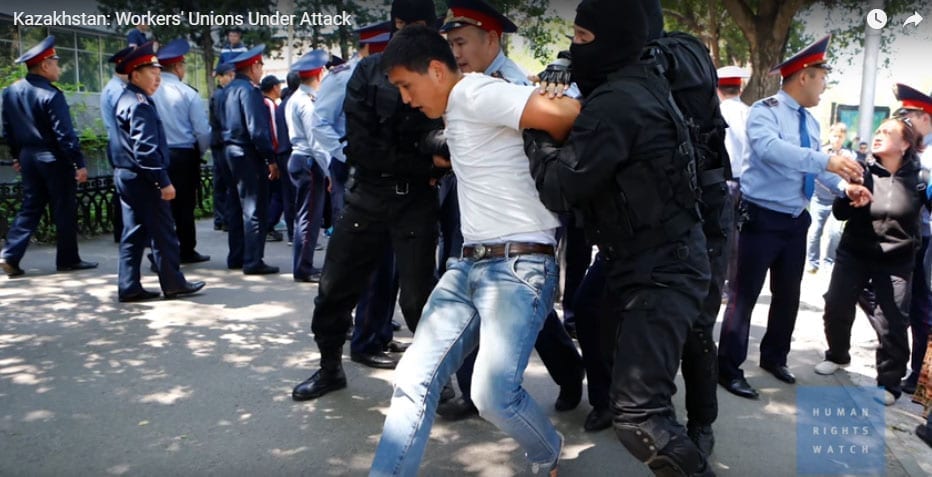
Dec 16, 2016
Union leaders tell the Solidarity Center that the Kazakhstan government has launched a campaign to intimidate union members and to malign and discredit the Confederation of Independent Trade Unions (CFTUK). In addition, the regime has initiated legal action to liquidate the confederation, while leaving intact a government-aligned federation.
Yet even in the face of threats and danger, union leaders and workers say they vow to hold protests if the CFTUK is dissolved.
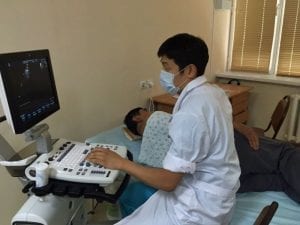
The Kazakhstan government is seeking to dissolve unions of health care workers and others. Credit: Kazinform
The Kazakhstan Ministry of Justice brought a legal challenge before the country’s Economic Court calling for revocation of CNTUK’s registration and its affiliated unions representing health and domestic workers—essentially making union activity illegal.
In a letter, the International Trade Union Confederation (ITUC) denounced the government’s failure to guarantee the right to freedom of association and called on it to withdraw the request before the Economic Court.
A new report also shows Kazakhstan’s new trade union law, adopted after strikes in 2011, has made it more difficult to organize independent unions in the country. “Changes to the labor and criminal codes have contributed to an environment hostile to worker activism,” according to Human Rights Watch, which released the report.
“‘We Are Not The Enemy’: Violations of Workers’ Rights in Kazakhstan” is based on interviews with more than 50 trade union leaders, labor activists and workers across Kazakhstan, and describes harassment, surveillance and, in some cases, spurious legal prosecution or dismissals in apparent retaliation for labor activism.
The International Labor Organization has examined the government’s failure to guarantee the right to freedom of association and in 2015 and again this year urged it to amend laws regarding union registration. The government has not acted on these recommendations.
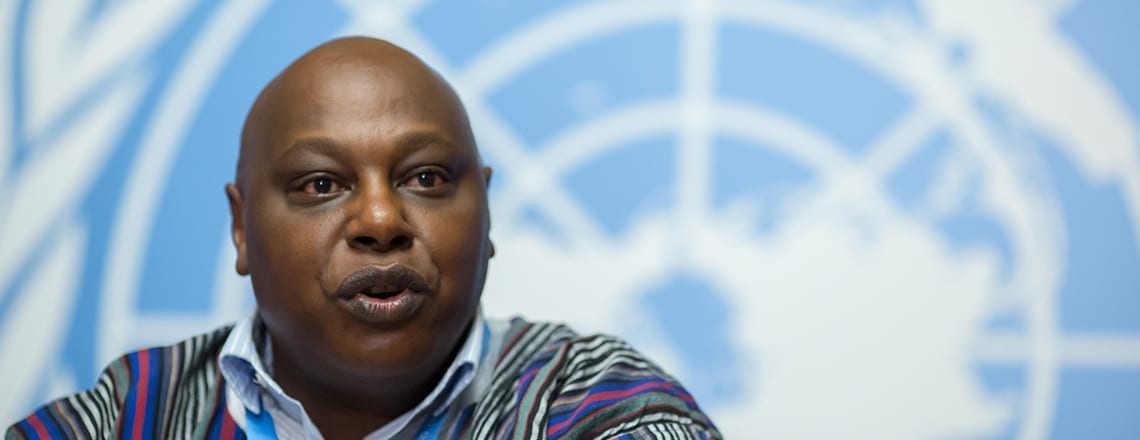
Dec 15, 2016
Describing United Nations Special Rapporteur Maina Kiai as “an effective watchdog against crackdowns of freedom of association and assembly,” AFL-CIO President Richard Trumka presented Kiai with the 2016 AFL-CIO George Meany-Lane Kirkland Human Rights Award.
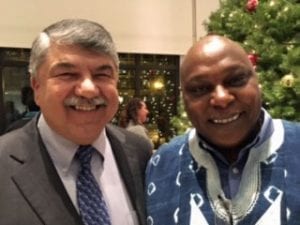
AFL-CIO President Richard Trumka (left) presented the AFL-CIO Human Rights Award to UN Special Rapporteur Maina Kiai. Credit: Solidarity Center/Tula Connell
“Maina inspires the advocates and workers who struggle to defend, to maintain and to grow the institutions of civil societies around the world,” said Trumka, speaking at the award ceremony last night in Washington, D.C. I’m talking about those who organize for women’s rights and workers’ rights, for indigenous people, for immigrants, for religious freedom and for economic justice.” (Watch the video of the full event.)
As UN Special Rapporteur on the rights to freedom of peaceful assembly and of association, Kiai in October presented the landmark “Rights to Freedom of Peaceful Assembly and of Association” report to the UN General Assembly. The report forcefully conveys how the vast majority of the world’s workers are disenfranchised from their rights to assembly and association—rights that are fundamental to all other human rights—either by exclusion or outright oppression.
‘Labor Rights Are Human Rights’
In his acceptance speech, Kiai outlined the challenges faced by champions of economic and social justice around the world, but called on labor and human rights activists to take successful lessons from the past to counter opposition to achieving fundamental human rights.
“Labor rights are human rights and human rights are labor rights,” Kiai said. “Today, we need to work differently. We need to reach out to each other. We know that every major struggle in the world has been successful through a grand alliance of trade unions and human and civil rights activists.”
Kiai previously served as head of the Kenya Human Rights Commission, and the Central Organization of Trade Unions–Kenya applauded Kiai, saying “the award singles out Maina for advancing worker and human rights issues and specifically highlighting the widespread denial of fundamental human rights at work.”
Kiai: Witness to Workers’ Struggles Worldwide
Since becoming special rapporteur in 2011, Kiai has traveled around the world, speaking with marginalized people in developed and developing countries, including workers, and hearing their struggles to exercise their fundamental rights firsthand, while speaking out about the abuses and injustices he has witnessed.
“I want to thank you for having the courage to speak up for truth,” said Trumka. “Your courage inspires all of us. Your integrity is a beacon to all of us.”
The annual Meany-Kirkland award, created in 1980 and named for the first two presidents of the AFL-CIO, recognizes outstanding examples of the international struggle for human rights through trade unions. Speakers at the event included Rep. Jamie Raskin (D-MD) and two worker Kiai met while traveling through the United States on a fact-finding mission this year, Lee Ruffin and Daniel Castellaños, founder of the National Guestworker Alliance.
The award went to the Trade Union Congress of Swaziland (TUCOSWA) in 2015; Building and Wood Workers’ International (BWI) and its affiliates in 2014; the International Domestic Workers Federation (IDWF) in 2013 and the Tunisian General Union of Labor (UGTT) and the General Federation of Bahrain Trade Unions (GBFTU) in 2012.
